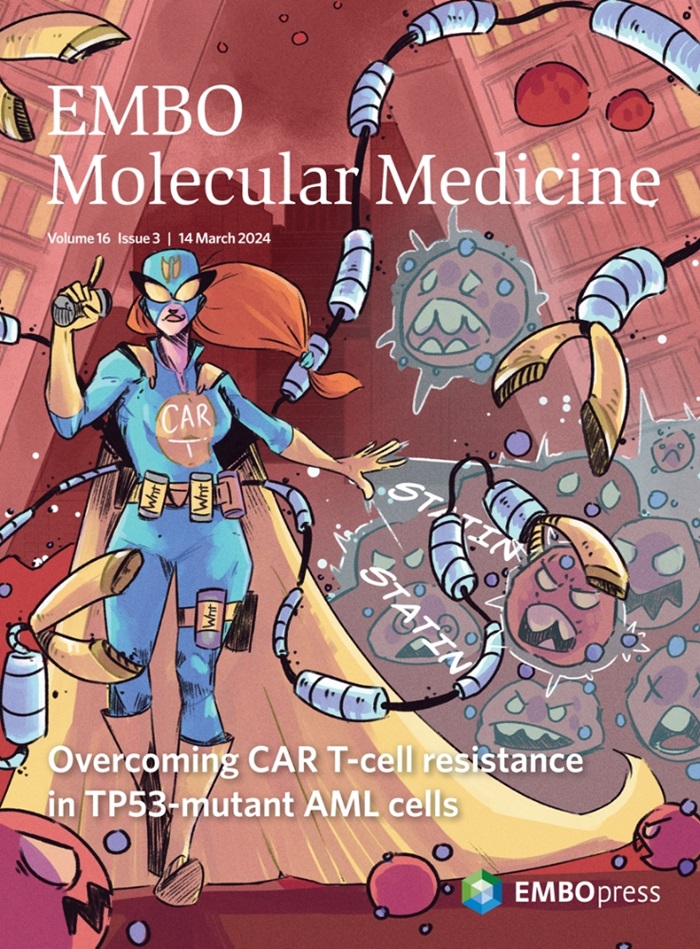肠道微生物群与乳腺癌治疗药物相互作用以调节疗效。
IF 8.3
1区 医学
Q1 MEDICINE, RESEARCH & EXPERIMENTAL
引用次数: 0
摘要
肠道微生物组,或居住在胃肠道的微生物群落,已成为乳腺癌病因和治疗的重要因素。具体来说,肠道细菌种群对乳腺癌治疗结果的影响是一个新兴的研究领域。微生物群在改变化疗和内分泌靶向治疗的药代动力学中的作用可以改变药物的疗效和毒性。此外,肠道微生物组调节全身炎症和免疫反应的能力可能会影响传统和免疫治疗策略治疗乳腺癌的有效性。总体而言,虽然肠道微生物群与乳腺癌治疗之间的双向相互作用仍在研究中,但其影响已日益得到认可。未来的研究可能会提供更明确的见解,并帮助开发个性化的治疗策略,以利用微生物群来改善乳腺癌的治疗效果。本文章由计算机程序翻译,如有差异,请以英文原文为准。
Gut microbiota interact with breast cancer therapeutics to modulate efficacy.
The gut microbiome, or the community of microorganisms residing in the gastrointestinal tract, has emerged as an important factor in breast cancer etiology and treatment. Specifically, the impact of gut bacterial populations on breast cancer therapeutic outcomes is an emerging area of research. The microbiota's role in modifying the pharmacokinetics of chemotherapy and endocrine-targeting therapies can alter drug efficacy and toxicity profiles. In addition, the gut microbiome's capacity to regulate systemic inflammation and immune responses may influence the effectiveness of both conventional and immunotherapeutic strategies for the treatment of breast cancer. Overall, while the bidirectional interactions between the gut microbiome and breast cancer therapies are still being studied, its impact is increasingly recognized. Future research may provide more definitive insights and help develop personalized therapeutic strategies to harness the microbiome to improve breast cancer treatment outcomes.
求助全文
通过发布文献求助,成功后即可免费获取论文全文。
去求助
来源期刊

EMBO Molecular Medicine
医学-医学:研究与实验
CiteScore
17.70
自引率
0.90%
发文量
105
审稿时长
4-8 weeks
期刊介绍:
EMBO Molecular Medicine is an open access journal in the field of experimental medicine, dedicated to science at the interface between clinical research and basic life sciences. In addition to human data, we welcome original studies performed in cells and/or animals provided they demonstrate human disease relevance.
To enhance and better specify our commitment to precision medicine, we have expanded the scope of EMM and call for contributions in the following fields:
Environmental health and medicine, in particular studies in the field of environmental medicine in its functional and mechanistic aspects (exposome studies, toxicology, biomarkers, modeling, and intervention).
Clinical studies and case reports - Human clinical studies providing decisive clues how to control a given disease (epidemiological, pathophysiological, therapeutic, and vaccine studies). Case reports supporting hypothesis-driven research on the disease.
Biomedical technologies - Studies that present innovative materials, tools, devices, and technologies with direct translational potential and applicability (imaging technologies, drug delivery systems, tissue engineering, and AI)
 求助内容:
求助内容: 应助结果提醒方式:
应助结果提醒方式:


